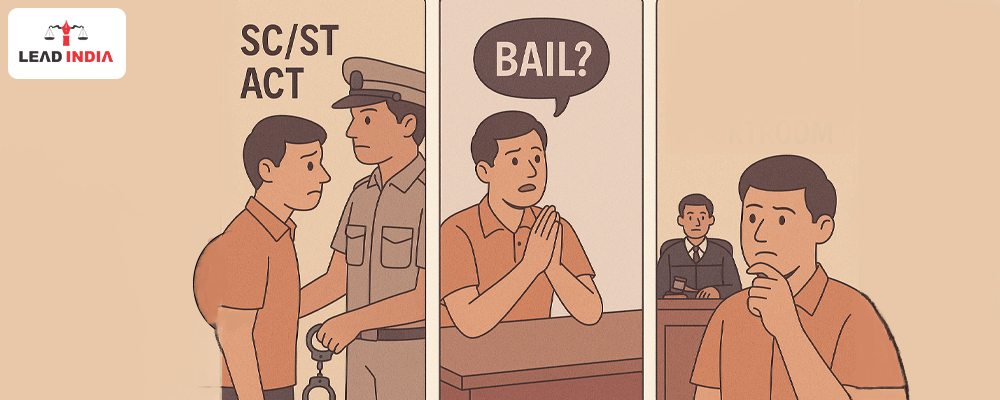Caught in an SC/ST Case? Here’s What You Need to Know First
When my colleague was falsely accused under the SC/ST Prevention of Atrocities Act, 1989, we panicked. We had heard these cases were non-bailable — but were unsure what that really meant. Here’s everything I learned while helping him get legal support, from the actual law to how bail was finally granted.
Understanding the SC/ST Act: More Than Just a Law
The SC/ST Act, 1989 has been made to protect the lower caste people from discrimination and violence.This Act is a vital protection tool but yes, sometimes it’s also misused, which makes knowing your legal rights extremely important.
Need A Legal Advice
The internet is not a lawyer and neither are you. Talk to a real lawyer about your legal issue

Are Offences Under the SC/ST Act Bailable? Let’s Clear the Confusion
The short answer? Most offences under the Act are non-bailable and cognizable. That means:
- Police can arrest without a warrant.
- You cannot get bail at the police station.
- Bail can only be granted by the Sessions Court or High Court after thorough legal scrutiny.
What Exactly Counts as an Offence Under the SC/ST Act?
Here’s a list of actions that the Act considers criminal atrocities:
- Forcing SC/ST individuals to eat or drink inedible or harmful substances
- Dumping excreta or waste near their homes to insult or harm them
- Parading them naked or painted, especially in public view
- Depriving access to land, water, voting, or other civil rights
- Forcing them into begging or bonded labour
- Public insults or humiliation based on caste
- Filing false FIRs to trap SC/ST members
Can Bail Be Granted? The Legal Answer May Surprise You
While the law defines these offences as non-bailable, courts have made room for exceptions — especially where false accusations or lack of caste-based intent are evident.
You can apply for:
- Regular Bail after arrest (in Sessions Court)
- Anticipatory Bail before arrest — though this is rare and allowed only when no prima facie offence is found
What the Courts Have Said: Important Case Law
1. Hitesh Verma v. State of Uttarakhand (2020)
The Supreme Court ruled that an act must be committed in public view and with caste-based malice for it to qualify under the Act. Personal disputes without public insult don’t count.
2. Dr. Subhash Mahajan v. State of Maharashtra (2018)
This case introduced the concept of preliminary inquiry before arrest. The court also allowed anticipatory bail in special cases.
A Real Example: What Happened with Two Army Jawans in 2021
Two army jawans were arrested under the SC/ST Act in a local case. The matter was reviewed, and since there was no public view or caste-related intent, they were granted bail within 48 hours. This shows how courts are actively preventing misuse.
How to Apply for Bail Under the SC/ST Act: Step-by-Step
- Hire an experienced advocate
- File a regular or anticipatory bail application in the Sessions Court
- If rejected, appeal to the High Court under Section 14A(2)
- Submit evidence to prove lack of prima facie offence, public view, or caste intent
What I Learned Through This Process
When I helped a friend through his SC/ST case, the legal maze was overwhelming. But once we understood the difference between public view and private disputes — and the importance of having a solid legal team — things got clearer. The Sessions Court initially denied bail, but the High Court granted it after proper legal reasoning and documentation.
Conclusion: Justice is Possible — But Know the Law
Yes, bail is possible under the SC/ST Act. While the law is strict — and rightly so for real atrocities — courts are equally serious about preventing its misuse.
If you’re wrongly accused:
- Don’t panic.
- Consult a specialized SC/ST lawyer
- Collect all facts and context
- File a proper application with clear arguments
Need Help With Bail Under SC/ST Act?
At Lead India, our expert advocates help you:
- Understand your bail rights
- Draft and file applications
- Challenge false accusations legally
One can talk to lawyer from Lead India for any kind of legal support. In India, free legal advice online can be obtained at Lead India. Along with receiving free legal advice online, one can also ask questions to the experts online free through Lead India.
FAQs
1. Can I get bail under the SC/ST Act?
Yes, bail is possible, but it’s not automatic. You’ll need to apply in the Sessions Court or High Court, especially if the case lacks strong evidence.
2. Are all offences under the SC/ST Act non-bailable?
Most are non-bailable, but courts can grant bail in cases where there’s no caste-based intent or if the accusations are false.
3. What’s the difference between regular bail and anticipatory bail?
Regular bail is applied for after arrest, while anticipatory bail is requested before arrest if there’s a risk of being falsely implicated.
4. Can the High Court grant bail if the Sessions Court denies it?
Yes, you can appeal to the High Court if bail is denied by the Sessions Court, especially if you can prove the case lacks merit.
5. How do I apply for bail under the SC/ST Act?
Hire a lawyer, file a bail application in the Sessions Court, and if needed, appeal to the High Court. Providing evidence of no caste-related intent helps strengthen your case.





 Talk to a Lawyer
Talk to a Lawyer